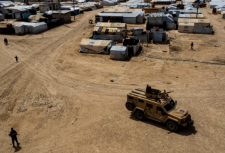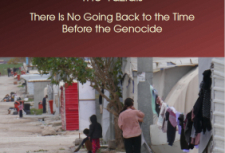Germany has taken a tougher law in relation to emigrants

The demonstration in front of the German parliament in Berlin is a sign of the growing concern of Yazidis about the new law on "deportation". Yazidi people, who have been persecuted for centuries, fear that they will be sent back to their countries of residence, where they may face further violence.
The new law will require the deportation of all asylum seekers who are denied protection in Germany, regardless of their individual circumstances. This will mean that Yazidis who have been granted asylum in Germany can still be deported if their asylum status is subsequently revoked.
Over the past six months, the number of deportations of persons who have been refused asylum has increased by 27% compared to the same period last year.
Most of the migrants are sent to their countries of origin — Georgia, Albania, Moldova, Serbia, Iraq. And more than 2,500 people were taken to Austria, where they crossed the German border. According to the EU's Dublin Rules, migrants must apply for asylum in the country they originally arrived in.
Based on this, the German Ministry of the Interior is introducing increasingly stricter rules for migrants. In early August, government officials came up with a new bill that gives the police broader powers to ensure deportation.
Yazidis are not the only group concerned about the new law. Other vulnerable groups, such as people with disabilities and victims of torture, also fear that they may be deported.
The German government has defended the new law, saying it is necessary to curb illegal immigration. However, critics argue that the law is inhumane and will put vulnerable people at risk.
The demonstration in Berlin is a clear indication that the new law is deeply unpopular. It remains to be seen whether the Government will want to amend the law in response to the concerns raised.
Meanwhile, Yazidis and other vulnerable groups remain in "limbo", not knowing whether they will be able to stay in Germany or will be forced to return to countries where they face persecution.
Tags: #yazidisinfo #newsyazidis #yazidisofgermany
Germany has taken a tougher law in relation to emigrants

The demonstration in front of the German parliament in Berlin is a sign of the growing concern of Yazidis about the new law on "deportation". Yazidi people, who have been persecuted for centuries, fear that they will be sent back to their countries of residence, where they may face further violence.
The new law will require the deportation of all asylum seekers who are denied protection in Germany, regardless of their individual circumstances. This will mean that Yazidis who have been granted asylum in Germany can still be deported if their asylum status is subsequently revoked.
Over the past six months, the number of deportations of persons who have been refused asylum has increased by 27% compared to the same period last year.
Most of the migrants are sent to their countries of origin — Georgia, Albania, Moldova, Serbia, Iraq. And more than 2,500 people were taken to Austria, where they crossed the German border. According to the EU's Dublin Rules, migrants must apply for asylum in the country they originally arrived in.
Based on this, the German Ministry of the Interior is introducing increasingly stricter rules for migrants. In early August, government officials came up with a new bill that gives the police broader powers to ensure deportation.
Yazidis are not the only group concerned about the new law. Other vulnerable groups, such as people with disabilities and victims of torture, also fear that they may be deported.
The German government has defended the new law, saying it is necessary to curb illegal immigration. However, critics argue that the law is inhumane and will put vulnerable people at risk.
The demonstration in Berlin is a clear indication that the new law is deeply unpopular. It remains to be seen whether the Government will want to amend the law in response to the concerns raised.
Meanwhile, Yazidis and other vulnerable groups remain in "limbo", not knowing whether they will be able to stay in Germany or will be forced to return to countries where they face persecution.
Tags: #yazidisinfo #newsyazidis #yazidisofgermany


























